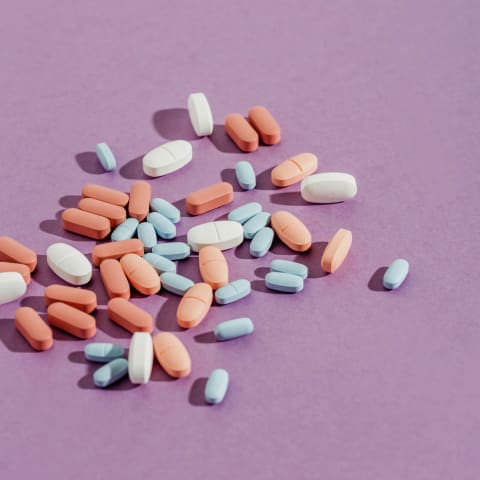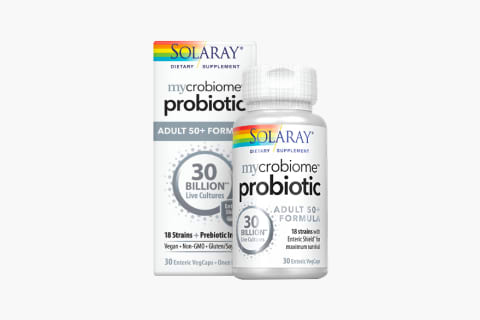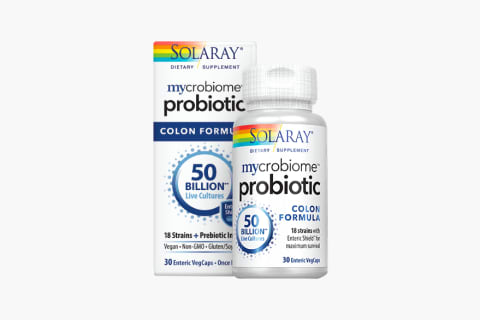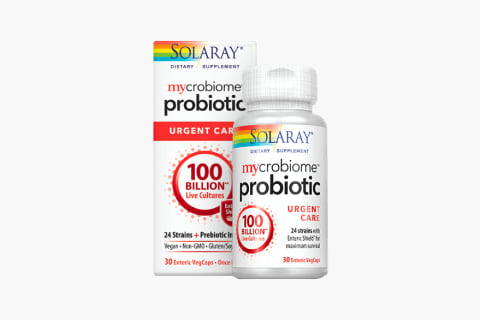Advertisement

If you've ever shopped for a probiotic and wondered whether you're the only one confused by options like 900 million, 50 billion, and 100 billion CFUs, trust us: You're not.
Wrapping your head around anything near that order of magnitude can be overwhelming, and not to complicate things even more, but that crazy number (which we'll get into below) is just one part of the puzzle. The thing to keep in mind is that scientists are still doing clinical research on probiotics, and the FDA hasn't issued guidance on how probiotic quantities should be labeled. But thankfully, you only need to understand a few basics to feel good about the probiotic you drop into your cart.
Why are the numbers so high?
To put it in context, your body naturally has about 50 trillion bacteria floating around at any given time (some estimates even go as high as 100 trillion, but at this point, who's even counting?). This microbial population—aka your microbiome—can contain up to 1,000 different species of bacteria1 or more, mainly located in your gut. If you weigh them all together, it equates to about 4 or 5 pounds—comparable to the weight of your brain—and scientists are finding that they can affect everything from digestion to immune response to mental health.
It’s a survival game before it’s a numbers game.
What does taking a probiotic actually do?
Probiotics are the good kind of live bacteria that may provide health benefits to our bodies. We're learning more about these benefits every day, but the gist is that probiotics may be able to help prevent the bad, harmful bacteria from taking over the gut. When your gut becomes unbalanced with unhealthy levels of certain bacteria, probiotics can help restore the balance.

Here's the thing: Unlike vitamins and other nutritional supplements, probiotics don't assimilate into your bloodstream—they've got to make their way to your intestines to populate and do their job. In other words, it's a survival game before it's a numbers game. So first, make sure you pick a probiotic that uses an enteric capsule, like the formulas in Solaray's Mycrobiome® Probiotic line, which will protect the live microorganisms as they make their way through your acidic digestive tract and into your gut, their destination. Without an enteric capsule, it won't really matter how many CFUs are on the bottle—there's a good chance a lot of the live bacteria may not make it past your stomach.
A super-high CFU count for a probiotic without that enteric capsule could also be necessary to try to compensate for poor survival rates.
Got it. So about those CFUs—how many are best?
The CFU number stands for colony-forming units. It represents the number of live probiotic bacteria in each serving that are capable of dividing and forming colonies in your gut.
Again, it's another area of ongoing research, but as a rule of thumb, a probiotic supplement should provide at least 1 billion CFUs for general gut health. Your daily dose will depend on a number of factors: For adults, a common daily range is between 10 and 20 billion CFUs2, but if you're hoping to make noticeable improvements—say, to digestion, mood, or weight—or offset the effects of antibiotics, a higher CFU count may be better. In some situations, doses as high as 100 billion CFUs or more are used (again, this may depend on the combination of strains and/or its specific use). If that sounds like a lot, most studies report that any common side effects are relatively mild, such as digestive discomfort.
Shop This Story:
So the next time you're shopping for a probiotic, remember that CFU count is only part of the equation. Do your research to make the right decision for your body, and talk with your doctor if you're thinking about adding a daily probiotic to your routine. Don't forget to check if the probiotic is protected by an enteric capsule: That CFU count might tell you the number of bacteria a probiotic starts out with, but how many make it to your gut alive is the only number that matters.



